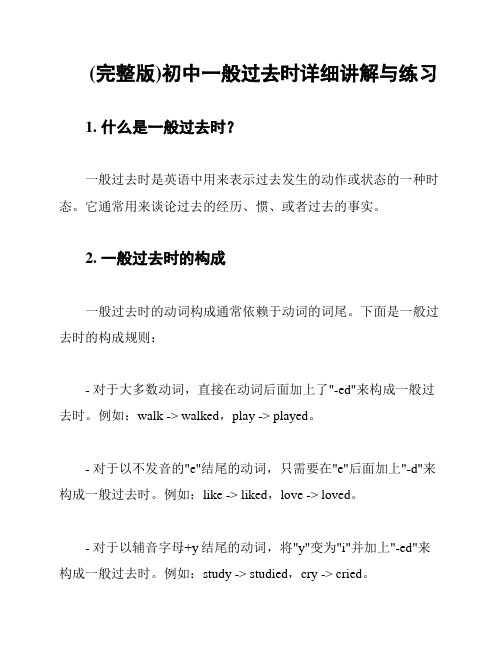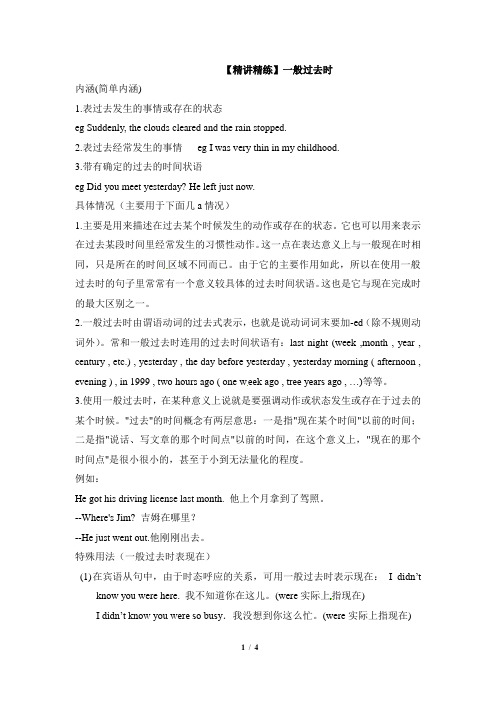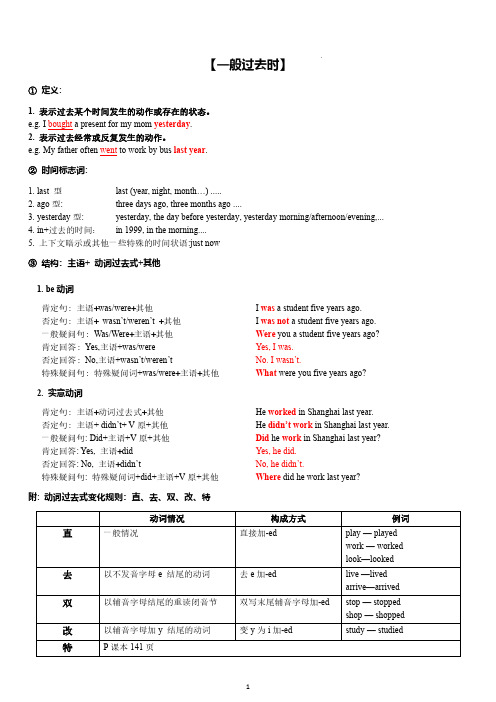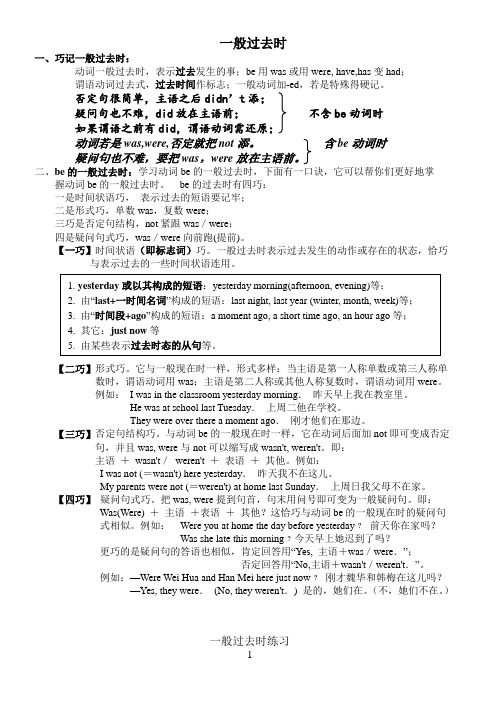初中一般过去时精讲精练
初中一般过去时讲解及练习

初中一般过去时讲解及练习学习一般过去时一般过去时的构成及用法1、一般过去时用法 :一般过去时表示过去某个时间里发生的动作或状态;过去习惯性、经常性的动作、行为;过去主语所具备的能力和性格。
2、构成:a. be 动词的一般过去时态am is 的过去式为was; are的过去式为were.构成:肯定句:主语+was (were) +表语如:I was late yesterday. (昨天我迟到了。
)否定句:主语+was (were) +not+表语如:We weren't late yesterday. (我们昨天没迟到)疑问句:Was (Were) +主语+表语如: Were you ill yesterday? (你昨天病了吗,)肯定回答: Yes, I was. (是的,我病了。
)否定句: No, I wasn't. (不,我没病。
)特殊疑问句: 特殊疑问词+was (were) +主语+表语如:How were you yesterday? 你昨天身体如何,b( 实义动词的一般过去时态肯定句要使用动词的过去式,否定句和疑问句要使用助动词did .肯定句为:主语+动词过去式+状语/宾语。
如: I went home at nine o'clock yesterday.(我昨天九点钟回的家。
) 否定句:主语+didn't +动词原形+宾语如:I didn't go home yesterday. (我昨天没回家。
)疑问句:Did +主语+动词原形+宾语,如: Did you go home yesterday? (你昨天回家了吗,)肯定回答: Yes, I did. (是的,我回了。
)否定回答:No, I didn't. (不,我没回家。
)特殊疑问句:特殊疑问词+一般过去时的一般疑问句,When did you go home yesterday?你昨天什么时候回家的,c. 行为动词的一般过去式变化规则:行为动词的过去式有规则变化和不规则变化两种。
(完整版)初中一般过去时详细讲解与练习

(完整版)初中一般过去时详细讲解与练习1. 什么是一般过去时?一般过去时是英语中用来表示过去发生的动作或状态的一种时态。
它通常用来谈论过去的经历、惯、或者过去的事实。
2. 一般过去时的构成一般过去时的动词构成通常依赖于动词的词尾。
下面是一般过去时的构成规则:- 对于大多数动词,直接在动词后面加上了"-ed"来构成一般过去时。
例如:walk -> walked,play -> played。
- 对于以不发音的"e"结尾的动词,只需要在"e"后面加上"-d"来构成一般过去时。
例如:like -> liked,love -> loved。
- 对于以辅音字母+y结尾的动词,将"y"变为"i"并加上"-ed"来构成一般过去时。
例如:study -> studied,cry -> cried。
- 部分动词的一般过去时需要进行不规则变化。
例如:go -> went,eat -> ate。
3. 一般过去时的用法一般过去时通常用来描述以下情况:- 过去发生的动作:I walked to school yesterday.- 过去的经历:He lived in London for five years.- 过去的事实:She was a teacher in the past.4. 一般过去时的句型练下面是一些练,帮助加深对一般过去时的理解和运用:1. 请用一般过去时填空:Yesterday, I ________ (watch) a movie at home.2. 完成句子:He _____ (visit) his grandparents last summer.3. 改写句子,使用一般过去时:I read a book yesterday. (改为否定句)4. 改写句子,使用一般过去时:They played basketball in the park. (改为疑问句)5. 总结一般过去时是用来表示过去发生的动作或状态的一种时态。
最新中考英语_【精讲精练】一般过去时

【精讲精练】一般过去时内涵(简单内涵)1.表过去发生的事情或存在的状态eg Suddenly, the clouds cleared and the rain stopped.2.表过去经常发生的事情eg I was very thin in my childhood.3.带有确定的过去的时间状语eg Did you meet yesterday? He left just now.具体情况(主要用于下面几a情况)1.主要是用来描述在过去某个时候发生的动作或存在的状态。
它也可以用来表示在过去某段时间里经常发生的习惯性动作。
这一点在表达意义上与一般现在时相同,只是所在的时间区域不同而已。
由于它的主要作用如此,所以在使用一般过去时的句子里常常有一个意义较具体的过去时间状语。
这也是它与现在完成时的最大区别之一。
2.一般过去时由谓语动词的过去式表示,也就是说动词词末要加-ed(除不规则动词外)。
常和一般过去时连用的过去时间状语有:last night (week ,month , year , century , etc.) , yesterday , the day before yesterday , yesterday morning ( afternoon , evening ) , in 1999 , two hours ago ( one w eek ago , tree years ago , …)等等。
3.使用一般过去时,在某种意义上说就是要强调动作或状态发生或存在于过去的某个时候。
"过去"的时间概念有两层意思:一是指"现在某个时间"以前的时间;二是指"说话、写文章的那个时间点"以前的时间,在这个意义上,"现在的那个时间点"是很小很小的,甚至于小到无法量化的程度。
例如:He got his driving license last month. 他上个月拿到了驾照。
一般过去时态精讲精练

一般过去时态精讲精练1. 用法: ①过去某个时间发生的动作例:His mother made some dumplings yesterday.②过去某个时间存在的状态例:Jim was 12 years old.③过去经常或反复发生的动作例:He often went to swim when he was a child.2. 与一般过去时连用的时间状语常见的有:Yesterday, last night, in 1990, once, two days ago, the day before yesterday , the other day 几天前4. 动词的过去式和过去分词的规则变化(注:不规则变化见附表)①一般在动词词尾加ed 例: wan t →wanted②以e结尾的动词,只加d 例: live →lived③以辅音字母加y结尾的动词,改y为i,再加ed 例: study →studied④以重读闭音节结尾,末尾只有一个辅音字母,双写这一辅音字母,再加ed例: stop →stopped5. 比较:He often goes to the park with his friends. (现在经常去,用一般现在时)He often went to the park when he was in the college.(大学) (过去经常去,用一般过去时)巩固练习:用所给动词的适当形式填空1. Jim ___________ (break) a pen the day before yesterday.2. _______________Henry _________ (clean) the classroom this morning?3. A few years ago, there _______ (be) only old houses.4. Where _________ they ________ (has) sports last year?5. My mother and I ___________ (speak) at the meeting yesterday.6. How many apples __________you _________ (buy) yesterday.7. ------________ (be) they all here yesterday? ------No, they _______________.8. Paul went upstairs(上楼)and ____________ (knock) at the door.9. I tried to catch the ball, but I ____________(miss错过) it.10. My sister _______________ (not do) her homework yesterday.11. ________ Mr. Beckman __________ (draw) a picture last month ? ------No, he ____________12. Jim often _______(go) to school at seven ,but he ______(go) to school at seven ten this morning.13. Kate _________ (play) ping-pong every week.14. My uncle in London __________ (send) a birthday present to me yesterday.15. When _____________ (be) you born?16. Father often __________ (tell) us his stories on summer evenings when he was alive.改错:每处划线中有错误,在题后改正1. We was in the factory yesterday.2. Did the twins make any paper flowers? ------Yes, they do.3. Every day she went shopping with us.4. They stoped to have a rest after walking so far.5. They didn’t went on a picnic last week.6. What did they made last Sunday.7. She was went to school early yesterday.8. The students were make many paper kites yesterday afternoon.9. Who did went to the park yesterday?10. She reads the book yesterday and listened to the radio.写出下列动词的过去式和过去分词(规则变化)relax ______________ kill ______________ dance _______________ watch _______________ study ______________ travel ______________ stop_______________ play _______________按要求句型转换:Jim was at home yesterday. Kate went to the park last week.否定句:___________________________ _________________________________一般疑问句:_________________________ _________________________________两回答:____________________________ _________________________________特殊疑问句:________________________ _________________________________巧记不规则动词过去式1.中间去e,末尾加t 如:keep→kept,feel→felt,sleep→slept,sweep→swept2.结尾d变t 如:build→built,lend→lent,send→sent,spend→spent3.遇见i改为a 如:ring→rang,sit→sat,drink→drank,sing→sang,swim→swam,begin→began,give→gave4.“骑(马)”“开(车)”“写(字)”——把i变o如:ride→rode,drive→drove,write→wrote5.“想”“买”“带来”“打仗”——ought换上如:think→thought,buy→bought,bring→brought,fight→fought6.“教书”“抓住”——aught切莫忘如:teach→taught,catch→caught7.ow/aw改为ew是新时尚如:know→knew,grow→grew,throw→threw,draw→drew8.“放”“让”“读”过去式与原形一样如:put→put,let→let,read→read/red。
七年级英语一般过去时讲解与练习

【一般过去时】①定义:1.表示过去某个时间发生的动作或存在的状态。
e.g.I bought a present for my mom yesterday.2.表示过去经常或反复发生的动作。
e.g.My father often went to work by bus last year.②时间标志词:st型last(year,night,month…).....2.ago型:three days ago,three months ago....3.yesterday型:yesterday,the day before yesterday,yesterday morning/afternoon/evening,...4.in+过去的时间:in1999,in the morning....5.上下文暗示或其他一些特殊的时间状语:just now③结构:主语+动词过去式+其他1.be动词肯定句:主语+was/were+其他I was a student five years ago.否定句:主语+wasn’t/weren’t+其他I was not a student five years ago.一般疑问句:Was/Were+主语+其他Were you a student five years ago?肯定回答:Yes,主语+was/were Yes,I was.否定回答:No,主语+wasn’t/weren’t No.I wasn’t.特殊疑问句:特殊疑问词+was/were+主语+其他What were you five years ago?2.实意动词肯定句:主语+动词过去式+其他He worked in Shanghai last year.否定句:主语+didn’t+V原+其他He didn’t work in Shanghai last year.一般疑问句:Did+主语+V原+其他Did he work in Shanghai last year?肯定回答:Yes,主语+did Yes,he did.否定回答:No,主语+didn’t No,he didn’t.特殊疑问句:特殊疑问词+did+主语+V原+其他Where did he work last year?附:动词过去式变化规则:直、去、双、改、特动词情况构成方式例词直一般情况直接加-ed play—playedwork—workedlook—looked 去以不发音字母e结尾的动词去e加-ed live—livedarrive—arrived 双以辅音字母结尾的重读闭音节双写末尾辅音字母加-ed stop—stoppedshop—shopped 改以辅音字母加y结尾的动词变y为i加-ed study—studied特P课本141页★即时即练I.写出下列动词的过去式和中文意思1.ride__________________2.feed__________________3.talk__________________4.do___________________5.grow__________________6.learn__________________7.pick__________________8.are__________________9.eat__________________ 10.study_________________11.see__________________12.take_________________ 13.buy__________________14.sleep_________________15.get__________________ 16.meet_________________17.watch_________________18.live__________________ 19.go________________20.dance________________21.write________________ II.句型转换1.Lucy did her homework at home.(改为否定句)Lucy________________her homework at home.2.His father worked all day last Monday.(改为一般疑问句)________his father________all day last Monday?3.I was very busy yesterday.(改为否定句)I________________very busy yesterday.4.There was some orange in the cup.()________there________orange in the cup?5.They went to the movies last Saturday.(对划线部分提问)________________they________last weekend?把下列句子改为否定句、一般疑问句并作肯定、否定回答1.My trip last weekend was excellent.2.The stars were so beautiful at night.3.The farmer showed Carol around the farm.4.We asked him some questions.III.用括号内所给单词的适当形式填空1.Mary and Tom________________(come)to China last month.2.Mike________________(not go)to bed until12o’clock,so he________________(get)up late.3.My cousin________________(read)English book in the living room now.4.I often________________(call)Mike in the morning.5.Tom________________(begin)to learn Chinese last year.6.She________________(visit)the country two years ago.7.The man________________(write)the book in2005.8.She________________(go)into the room because she________________(forget)her key9.I________________(wash)the clothes and________________(clean)the room.10.My mother________________(go)shopping yesterday.11.He________________(be)busy last Sunday,but you________________(be)free.IV.Grammar Focus1.—你学校的旅行怎么样?—太棒啦!________________________________________________________________________________________________? ________________________________________________________________________________________________!2.—你去过动物园了吗?—没有,我去了农场。
七年级英语一般过去时详细讲解与练习题人教版

一般过去时一、巧记一般过去时:动词一般过去时,表示过去发生的事;be 用was 或用were, have,has 变had ;谓语动词过去式,过去时间作标志;一般动词加-ed ,若是特殊得硬记。
否定句很简单,主语之后didn ’t 添; 疑问句也不难,did 放在主语前; 不含be 动词时如果谓语之前有did ,谓语动词需还原;动词若是was,were,否定就把not 添。
含be 动词时疑问句也不难,要把was ,were 放在主语前。
二、be 的一般过去时:学习动词be 的一般过去时,下面有一口诀,它可以帮你们更好地掌 握动词be 的一般过去时。
be 的过去时有四巧:一是时间状语巧, 表示过去的短语要记牢;二是形式巧,单数was ,复数were ;三巧是否定句结构,not 紧跟was /were ;四是疑问句式巧,was /were 向前跑(提前)。
【一巧】时间状语(即标志词)巧。
一般过去时表示过去发生的动作或存在的状态,恰巧 与表示过去的一些时间状语连用。
【二巧】形式巧。
它与一般现在时一样,形式多样:当主语是第一人称单数或第三人称单 数时,谓语动词用was ;主语是第二人称或其他人称复数时,谓语动词用were 。
例如: I was in the classroom yesterday morning . 昨天早上我在教室里。
He was at school last Tuesday . 上周二他在学校。
They were over there a moment ago . 刚才他们在那边。
【三巧】否定句结构巧。
与动词be 的一般现在时一样,它在动词后面加not 即可变成否定 句,并且was, were 与not 可以缩写成wasn't, weren't 。
即:主语 + wasn't / weren't + 表语 + 其他。
例如:I was not (=wasn't) here yesterday . 昨天我不在这儿。
中学英语一般过去时精讲精练
一般过去时
3. 一般疑问句 did + 主语 +行为动词原形 was / were + 主语 +其他成分 eg. - Did you go shopping yesterday? -Yes, I did. / No, I didn’t. -Was she 15 years old last year? 4. 特殊疑问句 特殊疑问词 +did + 主语 +行为动词原形 特殊疑问词 +was / were + 主语 +其他成分 eg. - Did you go shopping yesterday? When and where were you born?
• 4、“辅音字母+y”尾,y改为i, 再
加 -ed。 carry -- carried cry—cried study – studied
过去式加 -ed 的读音
1、在清辅音后,读清辅音 / t / 。
worked / kt / helped / pt / passed / st /washed / t / watched / t /
如hope→hoped love – loved
dance -- danced live→lived live -- lived
• 3、 辅音字母结尾词,重读闭音节
先双写,然后才能加-ed. 如: stop→stopped plan(计划) →planneddrop -- dropped beg -begged
2、在浊辅音和元音后,读浊辅音 / d / 。played / d / carried / id / answered / d / lived / vd / used / zd / called / ld / 3、在 / t, d / 音后面, 读 / id / 。
一般过去时精讲精练
一般过去时精讲精练I. 何时使用一般过去时?一般过去时表示在过去某个时间里发生的动作或存在的状态。
例如:Lin Tao left for Shanghai at 8:00 yesterday morning.林涛昨天早上八点去上海了。
He was ill last night.昨晚他生病了。
它可以具体分为以下几种情况:1)表示过去经常或反复发生的动作。
例如:Li Tao always went to work by bus last term.上学期李涛一直乘公共汽车上班。
2)表示已故的人曾经做过的事情。
例如:Lao She wrote many great works. 老舍写过许多脍炙人口的作品。
3)表示过去所发生的一系列的动作。
例如:The old man came into the room, took off his clothes and went to bed.这位老人走进屋,脱下衣服,然后上床睡觉了。
Mr. Black got up at six o'clock this morning, dressed, had breakfast, and went to work.布莱克先生今天早上六点起床、穿衣服、吃饭,然后去上班了。
II.如何识别一般过去时?每个时态都会有其独特的标志性词语(主要是时间状语),我们可以称其为“标志词”。
一般过去时常见的标志词有:1. yesterday, the day before yesterday.2. last week / year / month / term …(简称last系列)3. two hours ago, three years ago, a moment ago…(简称ago系列)4. in / on + 过去的年/月/日,如in 1999, on April, 20055. just now, once upon a time, one day…用法讲解Ⅰ. be动词的一般过去时。
一般过去时讲解精讲精练
2. I
Were you at home two days ago? Yes , I was. No, I wasn’t
3. They were in Beijing in 1990.
Were they in Beijing in 1990? Yes ,they were. No, they weren’t.
现在进行时
The bus is leaving at 8:00.
be动词(was,were) 实义动词(played,worked,talked)
主语+谓语
1. 2. 3. 4. 5. 6.
My father was at work yesterday afternoon.
I was at home two days ago. They were in Beijing in 1990. He worked here last year. I cleaned the room yesterday. They did home,然
后才能加-ed。
stop→stopped
plan(计划) →planned
drop
-- dropped
beg -- begged
再加 -ed。
4、“辅音字母+y”尾,y改为i,
carry
-- carried
study -- studied
写出下列动词的过去式 Practice
put----- put do--- did read-- read
come--- came take-- took see------ saw give-- gave
say--- said get--- got
(word完整版)七年级英语一般过去时详细讲解与练习题人教版
一般过去时详细讲解与练习题一、巧记一般过去时:动词一般过去时,表示过去发生的事;be 用was 或用were, have,has 变had ;谓语动词过去式,过去时间作标志;一般动词加-ed ,若是特殊得硬记。
否定句很简单,主语之后didn ’t 添; 疑问句也不难,did 放在主语前; 不含be 动词时如果谓语之前有did ,谓语动词需还原;动词若是was,were,否定就把not 添。
含be 动词时疑问句也不难,要把was ,were 放在主语前。
二、be 的一般过去时:学习动词be 的一般过去时,下面有一口诀,它可以帮你们更好地掌 握动词be 的一般过去时。
be 的过去时有四巧:一是时间状语巧, 表示过去的短语要记牢;二是形式巧,单数was ,复数were ;三巧是否定句结构,not 紧跟was /were ;四是疑问句式巧,was /were 向前跑(提前)。
【一巧】时间状语(即标志词)巧。
一般过去时表示过去发生的动作或存在的状态,恰巧 与表示过去的一些时间状语连用。
【二巧】形式巧。
它与一般现在时一样,形式多样:当主语是第一人称单数或第三人称单 数时,谓语动词用was ;主语是第二人称或其他人称复数时,谓语动词用were 。
例如: I was in the classroom yesterday morning . 昨天早上我在教室里。
He was at school last Tuesday . 上周二他在学校。
They were over there a moment ago . 刚才他们在那边。
【三巧】否定句结构巧。
与动词be 的一般现在时一样,它在动词后面加not 即可变成否定 句,并且was, were 与not 可以缩写成wasn't, weren't 。
即:主语 + wasn't / weren't + 表语 + 其他。
例如:I was not (=wasn't) here yesterday . 昨天我不在这儿。
- 1、下载文档前请自行甄别文档内容的完整性,平台不提供额外的编辑、内容补充、找答案等附加服务。
- 2、"仅部分预览"的文档,不可在线预览部分如存在完整性等问题,可反馈申请退款(可完整预览的文档不适用该条件!)。
- 3、如文档侵犯您的权益,请联系客服反馈,我们会尽快为您处理(人工客服工作时间:9:00-18:30)。
初中一般过去时讲解+练习定义: 1. 表示过去某个时间发生的动作或存在的状态。
2. 表示过去经常或反复发生的动作。
基本用法1.一般过去时通常用来表示过去发生的动作或存在的状态。
如: --- Where were you last week? 上周你在哪儿?--- I was at my uncle's home in the countryside. (上周)我在乡下的叔叔家。
2.表示过去经常或反复发生的动作,常和表示频度的时间状语连用,如often, always,once a week等。
---She went to the cinema once a month when she was at school.她上学时每个月去看一场电影。
---When I was in the countryside,I often walked by the riverside.我在乡下时经常在河边散步。
判断标志1.与ago连用的时间状语如: a moment ago, two minutes ago, six months ago, one week ago…等----We were primary students5years ago.五年前我们是小学生。
2.与last 连用的时间状语last week, last year, last month, last day…----He suddenly fell ill last night.他昨晚突然病倒了。
3.与 yesterday 连用的时间状语yesterday morning, yesterday morning …---We weren't late yesterday.我们昨天没迟到.※the day before yesterday 昨天4.与 one 连用的时间状语one morning 某个早上,one evening 某个夜晚5.与that连用的时间状语that day, that morning, that year…6.其他时间状语just now 刚刚in the old days 在过去in 1980 at that time在那时【巩固练习】一、请用正确动词形式填空1.He__________(live)in Wuxi two years ago.2.The cat__________(eat)a bird last night.3.We__________(have)a party last Halloween.4.Nancy__________(pick)up oranges on the farm last week.5.I__________(make)a model ship with Mike yesterday.6.They__________(play)chess in the classroom last PE lesson.7.My mother__________(cook)a nice food last Spring Festival.8.The girls__________(dance)at the party last night.9.I__________(watch)a cartoon on Saturday last week.10.______you_______(visit)your relatives last Spring Festival?11.______he_______(fly)a kite on Sunday?Yes,he______.12.Gao Shan_______(put)up the picture last night.13.I____________(sweep)the floor yesterday.14.What______she_______(find)in the garden last morning?15.Her father_______(read)a newspaper last night.16.Mike_________________(not go)to bed until12o’clock last night.17.I listened but___________(hear)nothing.18.How many people________(be)there in your class last term?19He_____(visit)the Great Wall last year.20.We________(have)a good time yesterday.21.We often_______(go)to school by bus last year.22.I________(live)in the village when I was a child.23.Mike______(see)a big tiger in the nature park last year.24.Sam_____(do)the housework yesterday.25.______(do)you_______(enjoy)yourself yesterday?26.______(do)you_________(play)the violin in the artroom yesterday?--No,I didn't.I_____(draw)some pictures there.27..I______(eat)a big pizza yesterday.28.There____(be)many sheep on the farm last year.29.I______(watch)a cartoon on Saturday.30.Her father_______(read)a newspaper last night.31.We_________to zoo yesterday,we_____to the park.(go)32.______you_______(visit)your relatives last Spring Festival?33.______he_______(fly)a kite on Sunday?Yes,he______.34.We often____________(play)games last term.35.She_____________(give)me a book a moment ago.二、改错。
1.We go to school early yesterday._____________________2.She buys a dress last week.________________________3.Did you liked playing football?________________________4.---Did you have a good trip?---No,I did. ______________________5.I enjoied Chinese very much.__________________6.How is Jane yesterday?_____________________7.He go to school by bus last week.____________________________ 8.He often goes home at6:00last month. ____________________________ 9.I can fly kites seven years ago.______________________________ 10.Did you saw him just now.____________________________________三、改写句子:1、Lucy did her homework at home.(改否定句)Lucy_______________her homework at home.2、He found some meat in the fridge(冰箱).(变一般疑问句)___________he_____________________meat in the fridge?3、There was some orange in the cup.(变一般疑问句)_______there_______orange in the cup?3.Frank read an interesting book about history.(一般疑问句)_______Frank_______an interesting book about history?4.Why not go out for a walk?(同义句)_______________________out for a walk?完型填空Tom did not like doing his homework.because he liked to do some 1_____ things after school.And hi s teacher always 2_____ a lot of mistakes in his homework.Then one day,his maths teacher 3_____ at Tom’s homework and saw that he got all his answers right.He was very 4_____ and surprised. The next morning before class, he called Tom 5_____ his desk and 6_____ to him.You got all your homework right this time.Did your father help you?”Sometimes Tom,s father helped him with his homework, 7_____ this time he d idn’t help Tom because he 8_____ at home.So Tom answered, ”NO,Sir.He Was busy last night,so I 9_____ to do it 10_____ .”()1.A.others B.another C.the other D.other()2.A.made B.found C.looked at D.looked()3.A.laughed B.knocked C.looked D.saw()4.A.please B.pleased C.pleasure D.sad()5.A.to B.for C.in D.at()6.A.talked B.asked C.spoke D.said()7.A.and B.but C.so D.or()8.A.isn’t B.won’t be C.wasn’t D.can’t be()9.A.wanted B.mustn’t C.liked D.had()10.A.itself B.of them C.myself D.himself。
